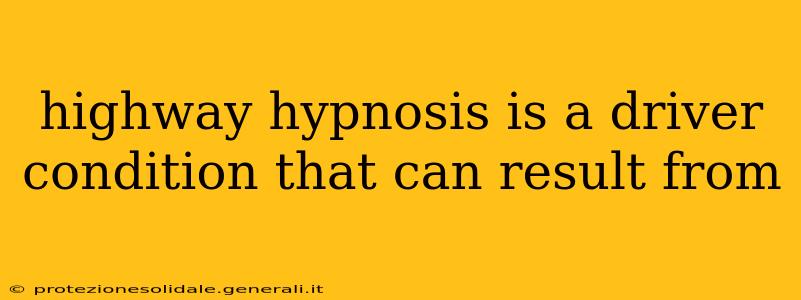Highway hypnosis, also known as highway fatigue or driving fatigue, is a dangerous condition that can occur during long drives on monotonous stretches of road. It's characterized by a trance-like state where drivers become unaware of their surroundings and their driving performance deteriorates. This isn't a medically recognized condition in the same way as, say, narcolepsy, but it’s a real and potentially deadly risk for drivers. Understanding its causes, symptoms, and prevention is crucial for ensuring road safety.
What Causes Highway Hypnosis?
Highway hypnosis isn't caused by a single factor, but rather a combination of circumstances that contribute to a state of reduced alertness and awareness. The most significant contributors include:
- Monotony: Driving long distances on straight, flat roads with minimal changes in scenery can lead to boredom and a lack of mental stimulation. This lack of stimulation can cause the brain to drift into a less alert state.
- Long Drives: Extended periods behind the wheel, particularly without breaks, deplete mental and physical energy, increasing the risk of highway hypnosis.
- Comfortable Driving Conditions: Ironically, comfortable cars with cruise control and automated features can contribute to highway hypnosis. These features reduce the need for active driving, leading to reduced engagement and alertness.
- Fatigue: Lack of sleep or tiredness from other activities significantly increases the susceptibility to highway hypnosis.
- Medications: Certain medications can induce drowsiness, increasing the likelihood of highway hypnosis, particularly when combined with long drives.
- Underlying Medical Conditions: Conditions that affect alertness or cognitive function can make drivers more prone to highway hypnosis.
What are the Symptoms of Highway Hypnosis?
Recognizing the symptoms of highway hypnosis is crucial for preventing accidents. While it can manifest differently in individuals, common signs include:
- Staring blankly ahead: A glazed or unfocused look is a key indicator.
- Muscle tension: Stiff neck, shoulders, and back are common.
- Reduced awareness of surroundings: Failure to notice other vehicles, road signs, or changes in the environment.
- Drifting from lane to lane: Unintentional lane changes or near misses.
- Delayed reactions: Slower response times to unexpected situations.
- Feeling disconnected from the driving experience: A sense of detachment or feeling like you're on autopilot.
- Blank spots in memory: Difficulty remembering details of the drive.
How Can I Prevent Highway Hypnosis?
Preventing highway hypnosis involves proactive measures to maintain alertness and engagement during long drives. Here are some essential strategies:
- Regular Breaks: Taking frequent breaks every 1-2 hours to stretch, walk around, and refresh is crucial. Even short stops can make a significant difference.
- Avoid Driving When Tired: If you're feeling sleepy or fatigued, postpone your trip or find a safe place to rest. Driving while tired is extremely dangerous.
- Vary Your Route: Choosing routes with varied scenery can help maintain alertness.
- Stay Hydrated and Eat Healthy: Dehydration and hunger can contribute to fatigue. Staying well-hydrated and eating nutritious snacks can help maintain energy levels.
- Avoid Driving Alone: Having a passenger can help keep you engaged and alert. They can also provide conversation and help keep you awake.
- Listen to Engaging Audio: Upbeat music, podcasts, or audiobooks can help to keep you mentally stimulated.
- Maintain Good Posture: A comfortable and supportive posture can help prevent muscle tension and fatigue.
- Adjust Your Vehicle's Climate Control: Make sure the temperature in your car is comfortable, and avoid becoming overheated or chilled.
Is Highway Hypnosis a Medical Condition?
While not a formally recognized medical condition like narcolepsy or sleep apnea, highway hypnosis is a real phenomenon with serious consequences. It's not a specific medical diagnosis but a description of a state of impaired driving resulting from a combination of factors like fatigue and monotonous driving conditions. It’s important to remember that the underlying causes can be medical in nature, such as sleep disorders, so addressing those is key.
How Can I Tell if I'm Experiencing Highway Hypnosis?
Self-awareness is critical. If you find yourself exhibiting any of the symptoms mentioned earlier—staring blankly, drifting in lanes, or feeling disconnected—pull over immediately to a safe location and rest. Don't try to power through it.
What Should I Do if I Suspect Highway Hypnosis?
If you suspect highway hypnosis, pull over to a safe location immediately, get out of the vehicle, stretch, and take a break. Drink some water, have a healthy snack, and give yourself time to fully wake up before resuming your drive.
By understanding the causes, recognizing the symptoms, and practicing preventive measures, you can significantly reduce your risk of experiencing highway hypnosis and ensure a safer driving experience. Remember, prioritizing safety on the road is paramount.
